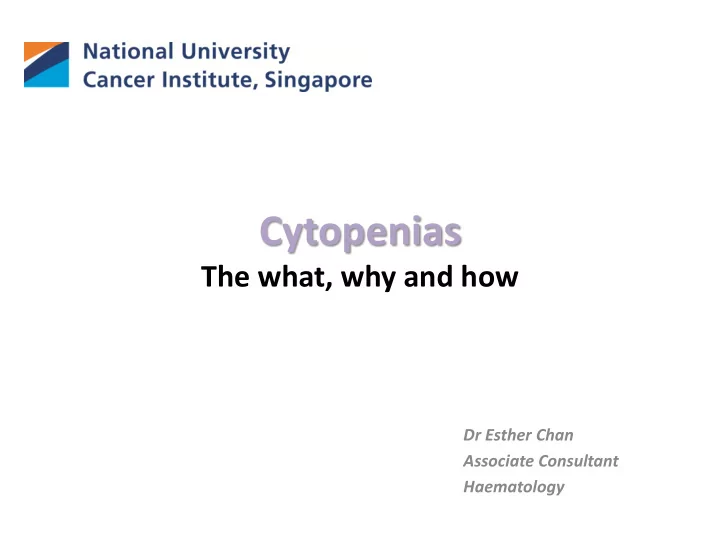

Cytopenias The what, why and how Dr Esther Chan Associate Consultant Haematology
3 main cell lines • RBC/Haemoglobin • White cell counts • Platelets
The WHAT
Anaemia
Leucopenia • The only clinically relevant parameter is neutropenia • Risk is of severe infection and this correlates to absolute neutrophil count • ANC – <1-0.5: Significantly increased risk of infection – <0.5: Highest risk of infection
Thrombocytopenia • Generally not clinically significant if >100K • Concern of bleeding increases once Plt<30k
Summary: The What • Drop fm pt’s baseline • Neutrophils <1 • Platelets <100 (<30)
The WHY
How is the FBC measured? • Haematology Analysers
• Principle of WBC, RBC and Plt counts – Cells forced in single file through aperture – Causes momentary decrease in electrical current – Creates pulse • Amplitude proportional to size • Number of pulses proportional to number
• Note that most modern machines combine laser, impedance, radiofrequency, direct current, peroxidase staining to optimize sensitivity
However…. • Machine errors are still possible!
The WHY - Lesson 1 • Exclude spurious low counts!
Important Approach • Concept of – Production issues • Empty • Packed • Faulty – Peripheral consumption/ destruction
‘Empty ’ • Aplastic anemia/ Marrow hypoplasia Causes: -idiopathic causes, - viral infections, - drug related causes, (Chemotherapy) -RT etc.
‘Packed’ • By marrow infiltration with abnormal cells – hematological malignancies ie leukemias – non hematological malignancies (metastasis) • By marrow fibrosis – Myelofibrosis
‘Faulty’ Myelodysplastic Syndrome • Defined as acquired bone marrow disorder • Characterised by ineffective haematopoiesis • Proliferation of abnormal clone of cells. which replaces normal haematopoietic cells. • Clinical manifestation of BM failure as well as tendency to transform into acute leukaemic phase • May be primary or secondary to other causes eg. chemotherapy, radiotherapy or environmental toxins.
Peripheral destruction/consumption • Infections – Dengue • Autoimmune – SLE • Hypersplenism – Cirrhosis with splenomegaly
The WHY - Lesson 2 • For approach to cytopenias – Is it • Production problem? • Destruction problem? – Narrows down differentials
The HOW
On seeing cytopenias on the FBC… • Do not interpret an FBC by itself! 1. Need for guidance from clinical history & physical examination 2. Need to take cues from the FBC/PBF
Clinical History • Symptoms/ Signs: - Fever - Chills - Rigors Sepsis as cause of cytopenia - Hypotensive - Toxic - Malar rash Possible SLE with concomittant cytopenias - Arthritis - Alcohol history Hypersplenism as cause of cytopenias - Splenomegaly
Signs/Symptoms Systemic Symptoms - LOA Possible Haematological - LOW Malignancy - Fever • Leukaemia • Lymphoma Clinical Signs - HEPATOMEGALY - SPLENOMEGALY - LN SWELLING - PALLOR
Cues on the FBC/PBF • ‘Empty’ Marrow – Pancytopenia – No abnormal cells on the PBF – No early white/red cells
• ‘Packed’ Marrow – Leucoerythroblastic picture • Early RBC/WBC in the peripheral blood • Tear drop cells – Blasts – Abnormal lymphoid cells – Rouleux
• ‘Faulty’ marrow – Dysplastic features • RBC: Anisopoikilocytosis, Basophilic stippling • WBC: Hypo/Hyper-granulated forms • Plt: Plt anisocytosis, Hypogranular forms
Other factors • Other cell lines – Monocytopenia? Bicytopenia? Pancytopenia • Differential Counts
Real life examples • Case 1
• Describe the FBC • What else would you want to know? • What are the differentials?
Don’t forget!
• Clinical History – Bruising – Loss of weight – Tired – Fever • Physical Examination – Lymph nodes palpable
Initial Impression • Leuocytosis with reduced Hb/ plts • Associated with systemic symptoms. Differentials: - Sepsis (Viral)? - Hematologic malignancy?
Other Factors:
• Final diagnosis – Acute leukaemia
Case 2 • How do you want to proceed?
• Clinical History – 50 year old man – Loss of appetite and some loss of weight. – No bleeding complications. – Noted increased lethargy at home. – Admitted when noted Hb low and thrombocytopenia. – NO hypothyroidism symptoms. – NO history of liver disease – NO special drug use – PE: NO hepatosplenomegaly
Other factors • PBF findings – Hyposegmented Neutrophils seen
• Diagnosis – Myelodysplastic syndrome
Case 3 • Any thoughts?
• Clinical history – 50yr Female – Elective admission for Total knee replacement – Incidental finding • What to do next? – Cancel operation? – Bone Marrow Aspiration?
• Other factors
Case 4
• Clinical History – 30yr Female – Brought to A&E by family – Fever for 3 days – Drowsiness, unable to rouse from bed for 1 day
• Other factors
• Diagnosis – Thrombotic Thrombocytopenic Purpura
Case 5
• History – 60yr Male – Well with no complaints – FBC done as part of health screening by his company
• Other factors
Classification of anemia – MCV and reticulocyte count MCV Microcytic Normocytic Macrocytic Low retics: Low retics Low retics: Iron Deficiency anemia Normal WBC/Platelets: Megaloblastic anemias Sideroblastic Anemia • AOCD Non-megaloblastic: • Early IDA • Liver disease Normal/high retics: • Renal failure • Alcohol Thalassemias • Pure red cell aplasia • Hypothyroidism Pancytopenia • Drugs • Primary failure: AA • MDS • Secondary failure: High retics: chemo/RT, MDS Reticulocytosis
Summary – The HOW • Correlate FBC with – pt ‘s clinical picture – & other factors (PBF/Differential counts) • To evaluate and manage all cytopenias safely
The End! Thank you for your attention Email: Esther_hl_chan@nuhs.edu.sg
Recommend
More recommend